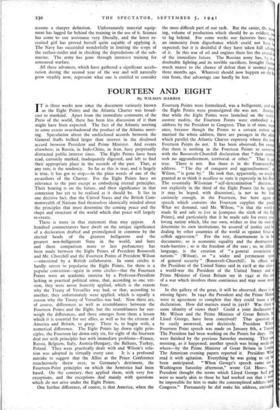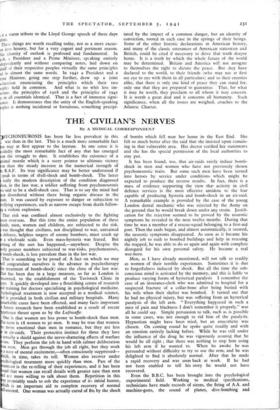FOURTEEN AND EIGHT
By WILSON HARRIS
IT is three weeks now since the document variously known as the Eight Points and the Atlantic Charter was broad- cast to mankind. Apart from the immediate comments of the Press of the world, there has been less discussion of it than might have been expected. The fact of the Atlantic meeting to some extent overshadowed the product of the Atlantic meet- ing. Speculation about the undisclosed accords between the General Staffs bulked larger than interest in the disclosed accord between President and Prime Minister. And events elsewhere, in Russia, in Indo-China, in Iran, have perpetually distracted public interest since. The Eight Points have been read, cursorily marked, inadequately digested, and -left to find their appropriate place in the records of the past. That, at any rate, is the tendency. So far as this is true, and it largely is true, it has got to stop,—in the plain words of one of the co-authors of the Charter. For the Eight Points have no relevance to the past except as embodying eternal principles. Their bearing is on the future, and their significance in that connexion has yet to be realised as it should be. It lies in one decisive fact, that the United States and the British Com- monwealth of Nations find themselves identically minded about the principles that must determine the coming peace and the shape and structure of the world which that peace will largely re-create.
There is more in that statement than may appear. A hundred commentators have dwelt on the unique significance of a declaration drafted and promulgated in common by the elected heads of the greatest belligerent and the greatest non-belligerent State in the world, and here and there comparison more or less perfunctory has been made between the Eight Points of President Roosevelt and Mr. Churchill and the Fourteen Poihts of President Wilson —unassisted by a British collaborator. In some circles it hardly serves to popularise the Eight Points, for there is a popular conviction—again in some circles—that the Fourteen Points were an academic exercise by a Professor-President lacking in practical political sense, that, according to one ver- sion, they were never honestly applied, which is the reason why the Treaty of Versailles was bad, or that, according to another, they unfortunately were applied, which is equally a reason why the Treaty of Versailles was bad. Now there are, of course, differences as well as resemblances between the Fourteen Points and the Eight, but the resemblances far out- weigh the differences, and there emerges from them a lesson which it is essential for our allies, as well as for the citizens of America and Britain, to grasp. There is, to begin with, a numerical difference. The Eight Points lay down eight prin- ciples, the Fourteen lay down only six, for eight of the fourteen deal not with principles but with immediate problems—France, Russia, Belgium, Italy, Austria-Hungary, the Balkans, Turkey, Poland. They were practically dealt with and Wilson's solu- tion was adopted in virtually every case. It is a profound mistake to suggest that the Allies at the Peace Conference treacherously threw over, to Germany's detriment, the Fourteen-Point principles on which the Armistice had been based. On the contrary, they applied them, with very few exceptions, and the exceptions deal mainly with questions which do not arise under the Eight Points.
One further difference, of course, is that America, when the Fourteen} Points were formulated, was a belligerent, and v. the Eight Points were promulgated she was not. Anolt• that while the Eight Points were launched on the wor] austere nudity, the Fourteen Points were embodied n address by the President to Congress. That is of some ir7.- ance, because though the Points to a certain extent s marised the whole address, there are passages in the ad which parallel the Atlantic Charter expressly where the f Fourteen Points do not. It has been observed, for exam that there is nothing in the Fourteen Points to cones with the Roosevelt-Churchill declaration that " their corm seek no aggrandisement, territorial or other." That is q true. There is not. But there is in the Fourteen-Pe address. " The day of conquest and aggrandisement," Wilson, " is gone by." He took that, apparently, so much granted as to think it needless to state it expressly in his P6 The essentially Wilsonian " self-determination " doctrine, out explicitly in the third of the Eight Points (to be app it may be. hoped, with discretion), is not to be In curiously enough, in the Fourteen, but here again speech which contains the Fourteen supplies the pa What we demand, said Mr. Wilson, " is that the world made fit and safe to live in [compare the sixth of the Points], and particularly that it be made safe for every loving nation which, like our own, wishes to live its own determine its own institutions, be assured of justice and f dealing by other countries of the world as against force selfish aggression." For the rest, disarmament is in documents; so is economic equality and the destruction trade-barriers ; so is the freedom of the seas ; so, in differ language, is the creation of " a general association nations" (Wilson), or "a wider and permanent cyst of general security " (Roosevelt-Churchill). In effect, a the President of the United States said in 1918 at the crisis a world-war the President of the United States and Prime Minister of Great Britain say in 1941 at the cn of a war which involves three continents and may soon invo four.
In this gallery of the great, it will be observed, there is missing figure. In 1941 the President and the Prime Mini. were in agreement so complete that they could issue a declaration. How did matters stand in ,x918? Was there same identity of views then? Could a joint declaration Mr. Wilson and the Prime Minister of Great Britain, A Lloyd George, have been conceived? That question be easily answered, and decisively. President Wilo Fourteen Point speech was made on January 8th, a Tiles& The President had been working on the Points for days. were finished by the previous Saturday morning. That morning, as it happened, another speech was being made where—by tilt Prime Minister of Great Britain in Lond The American evening papers reported it. President WIL read it with agitation. Everything' he was going to say been anticipated. " When George's speech came 0111 Washington Saturday afternoon," wrote Col. House, President thought the terms which Lloyd George had g' were so nearly akin to those he had worked out that it W be impossible for him to make the contemplated address bef Congress." Fortunately he did make his address, embod it a warm tribute to the Lloyd George speech of three days efore.
These things are worth recalling today, not as a mere excur- on into history, but for a very cogent and pertinent reason. his identity of outlook is profound and fundamental. In 918, a President and a Prime Minister, speaking entirely idependendy and without comparing notes, laid down on phalf of their respective peoples virtually the same principles ad in almost the same words. In 1941 a President and a jime Minister, going one step further, drew up a joint eclaration enunciating the principles which their two copies held in common. And what is no whit less im- rtant. the principles of 1918 and the principles of 1941 ,e in all essentials identical. That is a fact of immense signi- ance. It demonstrates that the unity of the English-speaking pies is nothing incidental or fortuitous, something precipi- tated .by the impact of a common danger, but an identity of conviction, rooted in each case in the springs of their beings. Some of the other historic declarations in American history, and many of the classic utterances of American statesmen and British, could be cited if necessary to drive that truth deeper home. It is a truth by which the whole future of the world may be determined. Britain and America will not arrogate to themselves the right to dictate the peace. But .hey have declared to the world, to their friends (who may not at first see eye to eye with them in all particulars) and to their enemies alike, that there is only one kind of peace they can stand for, only one that they are prepared to guarantee. That, for what it may be worth, they proclaim to all whom it may concern. It is worth a great deal and it concerns all humanity. Such significance, when all the issues are weighed, attaches to the Atlantic Charter.



























 Previous page
Previous page